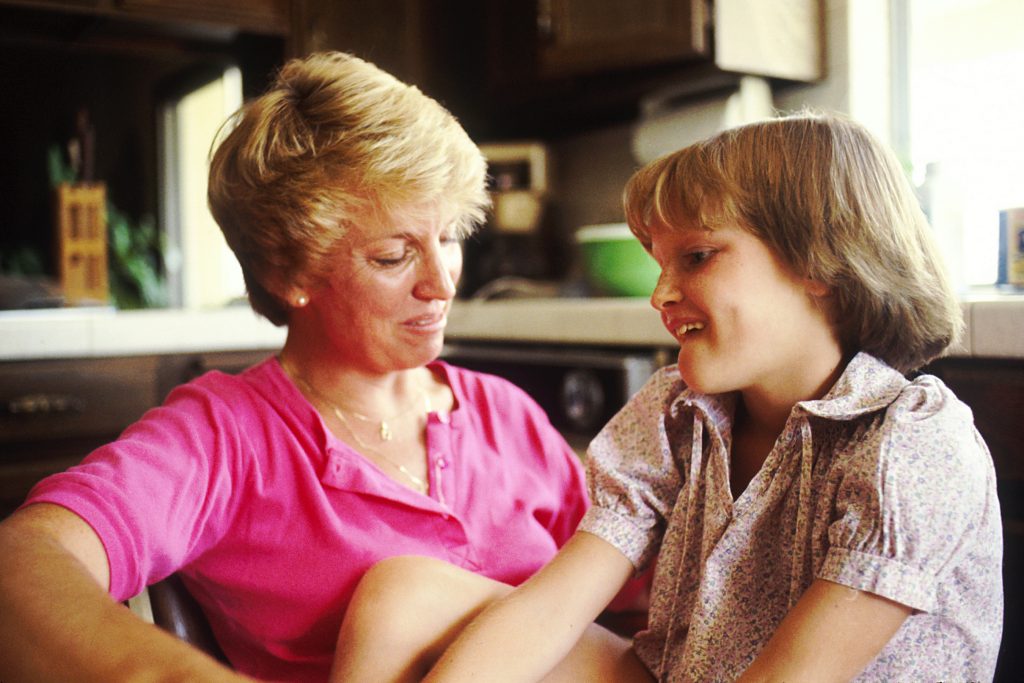by Sharon Stay Brown

When I try to grow seedlings in my shaded kitchen window, they don’t grow straight up. They bend, growing long and spindly, towards the small amount of light available. The scientists call this inclination in nature the Heliotropic Effect. It is the tendency in all living systems toward positive energy, in this case, light, and away from negative energy, or darkness. From single-cell organisms to complex human systems, everything alive has an inherent inclination toward the positive and away from the negative.
Can we as mothers use this heliotropic effect in our homes? Which energy is more likely to draw our children toward us? Anger, blaming, and criticizing, or compassion, forgiveness, kindness, and encouragement?
One day my precocious three-year-old was introducing herself and her older sister to a visitor at the front door.

“This is my sister. She’s the good one. I’m the bad one.”
I was shocked to find my discipline for this very active child was giving her the wrong message. I had to make a conscious effort to be more positive. By the way, this is a stock photo, not my daughters.
Since people tend to turn towards the positive, what can we do to fill our homes with light and positive energy?
1. We can look for the good in our children (and husbands) instead of seeing all the things that need correcting. My mother once told me that she just wanted me to be the best I could be. To her that meant she pointed out all the little things I could change to be better. Instead of improving me, it made me resentful, because she never mentioned the good things I had done. If I cleaned my room, she pointed out a toy left on the floor, not all the toys on the shelf. If I got a B on a test, that was what she noticed, not the A’s. Even as an adult, she once told me a favorite comfortable dress made me look fat. It made me feel fat and dowdy and I never wore that dress again, even though I liked the dress. Her criticism did not make me want to be better, it just made me feel like a failure.
2. Listen. Respect their views and beliefs, even if they are different than yours. Steven Covey (Seven Habits of Highly Effective Families) teaches we should seek to understand before we seek to be understood. Don’t be too quick to jump in with a solution. Every time I did that, it cut off the communication. Each child should be able to express his or her feelings about any subject, problem or experience. Instead of saying what you think, ask them what they think. Express love for and confidence in the child.

3. Say I’m sorry quickly and freely. Forgive quickly and freely. Forgiveness goes hand in hand with love.
4. Express love. Tell them in words, write it in notes, show them with touch–a hug when they permit, just a hand on the arm if they are at the stage when they are uncomfortable with hugging or kissing.

Often we assume that they must know how much we love them, but often they don’t. In a class I took for parents of non-compliant children, our instructor modeled setting limits. “I love you more than you’ll ever know,” he’d say, “and that’s why you need to be home by midnight.”
People have different things that make them feel loved, different love languages. Find out if a note, a loving touch, a small gift, a service, or the words themselves make your child feel loved.
But what if the child has behaved so outrageously that you don’t feel love? I had a rebellious son who was a constant source of aggravation. He’d walk in the room and my hackles would rise. It was hard to express love. But often when children are acting their worst, they need love the most. David Bednar tells us: “The word love is both a verb and a noun. We think, ‘Well, I have to have the feeling, the noun, before I start doing love, the verb.’ It works both ways. …The feeling follows love, the verb.” Acts of service and kindness result in increased feelings of joy and love in our families.
5. Play together. Picnics, camping, family projects, swimming, movies, bedtime stories, board games; there are so many activities families can do together to foster greater love and harmony. Dieter Uchtdorf has said, “In family relationships, love is really spilled T-i-M-E.” It’s easy to get caught up in day-to-day routines and lose sight of the people we care most about.

6. Encourage, support, serve, be gentle. Praise the good you see. “You are a good worker, you really helped me out today.” “I appreciate your helping your sister.” “I can see you put a lot of effort into this.” “Thank you for your kindness.”
7. Speak kindly. Kindness softens hearts. Children see and learn from both the kind and unkind things we say or do. Kind words not only lift our spirits in the moment they are given, but they can linger with us over the years. One time my husband was riding in the car with his older sister. He had been thinking that the girls seemed to like the “bad boys” better and was wondering if maybe he should change and become bad. His sister, not knowing his thoughts, said: “You know, some day you will make a wonderful husband for some woman.” This encouraged him throughout his dating years, and her words were prophetic, because he has made a wonderful husband for me.
Our two youngest daughters fought all the time. They were always butting heads and putting each other down.

Desperately, I searched for solutions. I tried an adaption of an idea I found in a book for teachers trying to influence their students. Before dinner each night, my girls had to say five nice things about the other. At first, it was nearly impossible for them to find five compliments, but after a time, they started looking for the good, and it got easier. Miraculously, the fighting diminished. Now, in adulthood, they are best friends.
If you shine the light of positive practices on your family, they’re going to follow it, because when lightness shines on darkness, human tendency is to follow the light.
